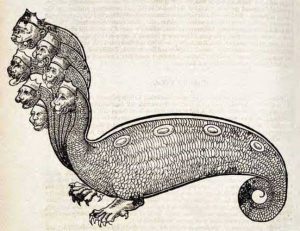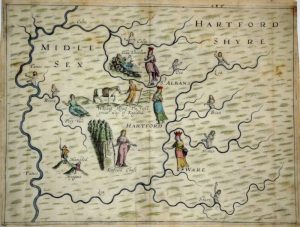“He’s gone that was the city’ grace,
Fierce Hydra now usurps his place.”
ll.3-4

Hydra. 1658. Special Collections, University of Houston Libraries. University of Houston Digital Library. Web. August 22, 2013.
An early modern depiction of the hydra can be found in Edward Topsell’s The History of four-footed beasts and serpents (London, 1658). Topsell records one legend in which it is claimed that “these monsters signifie the mutation or change of wordly affairs” (p. 735).
Rebekah King
_______________________________________________________
“Enameled vales and crystal streams
Prove now, alas, poor Broadfield’s dreams.”
ll. 90-91.
See “Broadfield Hall“.
_______________________________________________________
“Lea’s drooping swains now sadly sing,
And Beane comes weeping from her spring.
Mimram and Stort in mourning weeds,
Showing their hearts for grief e’en bleeds”
ll. 96-99 ff.
The second half of Pulter’s poem is based on Michael Drayton’s Poly-Olbion (London: [Humphrey Lownes] for M. Lownes, I. Browne, I. Helme, I. Busbie, 1612), which includes an illustration depicting the rivers of Hertfordshire, the county in which Pulter lived. In the “The Sixteenth Song” the rivers recount, with some nostalgia, their county’s history. See Drayton, unnumbered illustration, 245–56; J. William Hebel, ed. Poly-Olbion by Michael Drayton Being the Fourth Volume of his Works (Oxford: Basil Blackwell, 1961), 312–27.
For more information about Drayton’s text, see The Poly-Olbion Project website.

